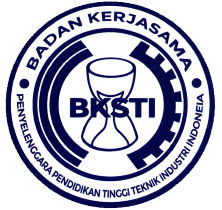Model Pengaruh Knowledge Management terhadap Kinerja Logistics Service Provider
(1) Universitas Indraprasta PGRI
(2) Departemen Teknik Industri, Universitas Indonesia
(3) Departemen Teknik Industri, Universitas Indonesia
(*) Corresponding Author
Abstract
Penelitian ini bertujuan untuk membuat model dan menguji faktor-faktor penting dalam implementasi Knowledge Management(KM) di perusahaan-perusahaan Logistics Service Provider(LSP) di Indonesia dan pengaruhnya terhadap kinerja LSP itu sendiri. Faktor-faktor penting yang menunjang implementasi KM untuk mencapai kinerja LSP yang diharapkan adalah budaya, struktur organisasi, strategi dan kepemimpinan, sumber daya manusia dan teknologi informasi. Kinerja LSP diukur berdasarkan pendekatan SCOR (Supply Chain Operation Reference). Validasi model penelitian dilakukan melalui wawancara semi terstruktur dengan ahli, sedangkan pelaksanaan survei dilakukan dengan menyebarkan kuesioner terhadap 63 perusahaan LSP di Indonesia yang menerapkan KM. Structural Equation Model(SEM) menggunakan Partial Least Square(PLS) digunakan dalam melakukan pengolahan dan analisis data. Hasil penelitian dihipotesiskan dapat menunjukkan bahwa faktor-faktor penting implementasi KM berpengaruh terhadap keberhasilan implementasi KM serta memberikan pengaruh terhadap kinerja LSP. Hasil penelitian ini ini memberikan bukti empiris untuk pentingnya implementasi KM di LSP di Indonesia. Temuan penelitian ini memberikan dasar untuk fokus pada faktor-faktor penting implementasi KM dalam menentukan strategi yang tepat untuk menunjang kinerja LSP yang lebih baik.
Full Text:
PDF (Indonesian)References
Coyle, J.J., Bardi, E.J. and Langley Jr, C.J., 1996, The Management of Business Logistics, 6th ed., West Publishing Co., St Paul, MN.
Coyle J.J., Bardi E.J., Langley Jr. J., 2003, The Management of Business Logistics: A Supply Chain Perspective, 7th, 425.
Knemeyer A.M. & Murphy P.R., 2004, Promoting The Value of Logistics to Future Business Leaders. Emerald.
The World Bank, Logistics Performance Index, (n.d), International LPI. https://lpi.worldbank.org/ international.
Novack R.A., Langley C.J., Rinehart L.M., 1995, Creating Logistics Value. Council of Logistics Management.
Dresner, M., & Xu K., 1995, Customer Service, Customer Satisfaction and Corporate Performance in The Service Sector. Journal of Business Logistics, 16(1), 23-40.
Evangelista, P. & Durst, S., 2015, Knowledge Management in Environmental Sustainability Practices of Third-party Logistics Service Providers. VINE 45(4). 509 – 529.
Flint D.J., Larsson, E., Gammelgaard B., 2008, Exploring Processes for Customer Value Insights, Supply Chain Learning and Innovation: An International Study. Journal of Business Logistics, Copenhagen Business School.
Yazdanparast, A., Manuj I., Swartz S.M., 2010, Co-creating Logistics Value: A Service-dominant Logic Perspectiv. Department of Marketing and Logistics, The University of North Texas.
Jothimani D. & Sarmah S.P., 2014, Supply Chain Performance Measurement for Third Party Logistics. Benchmarking: An International Journal, 21(6), 944 – 963.
Terzieva, M., 2014, Project Knowledge Management: How Organizations Learn from Experience. Conference on Enterprise Information Systems.
Newman, V., 1999, Redefining knowledge management to deliver competitive advantage. Journal of Knowledge Management. 1 (2), 123-128.
Ansari, M. Youshanlouei, H.R. & Mood M.M., 2012, A Conceptual Model for Success in Implementing Knowledge Management: A Case Study in Tehran Municipality, Iran. Journal of Service Science and Management.
Novak, A., 2017, Knowledge Management and Organizational Performance – Literature Review. International School for Social and Business Studies.
Valmohammadi, C. & Ahmadi M., 2015, The Impact of Knowledge Management Practices on Organizational Performance: A Balanced Scorecard Approach. Journal of Enterprise Information Management 28 (1).
Rasula, J. Vuksic, B. & Stemberger, M.I., 2012, The Impact of Knowledge Management on Organisational Performance. Economic And Business Review 14(2),147–168.
Lee H. & Choi B., 2003, Knowledge Management Enablers, Processes, and Organizational Performance: An Integrative View and Empirical Examination. Journal of Management Information Systems 20(1). 179-228.
Al-Bastaki, Y. & Shajera A., 2009, Organisational Readiness for Knowledge Management: University of Bahrain Case Study. University of Bahrain.
Yeh Y.J., Lai S.Q. & Ho C.T., 2006, Knowledge Management Enablers: A Case Study. Industrial Management & Data Systems 106 (6). 793-810.
Siemieniuch, C.E. & Sinclair, M.A., 2004, A Framework for Organisational Readiness for Knowledge Management. International Journal of Operations & Production Management 24(1). 79 – 98.
Pérez-López, S. & Alegre, J., 2012, Information Technology Competency, Knowledge Processes and Firm Performance. Industrial Management & Data Systems 112(4). 644 – 662.
Schmaltz, R., Hagenhoff, S. & Kasparc C., 2004, Information Technology Support for Knowledge Management in Cooperations.
Cooper, L., Huscroft J.R., Overstreet R.E. & Hazen B.T., 2016, Knowledge Management for Logistics Service Providers: The Role of Learning Culture. Industrial Management & Data Systems 116 (3).
Johanson, G. and Brooks, G., 2010, Initial Scale Development: Sample Size for Pilot Studies. Educational and Psychological Measurement, 70, 394-400.
Barclay, D., Higgins, C. and Thompson, R., 1995, The Partial Least Squares (pls) Approach to Casual Modeling: Personal Computer Adoption Ans Use as an Illustration.
Urbach, N. & Ahlemann, F. (2010). Structural Equation Modeling in Information Systems Research Using Partial Least Squares. Journal of Information Technology Theory and Application11(2). 5-39.
Latan, H. & Ghozali, I (2012). Partial Least Square : Konsep, Teknik dan Aplikasi. SmartPLS 2.0 M3. Semarang: Badan Penerbit Universitas Diponegoro.
DOI: http://dx.doi.org/10.30998/joti.v3i1.7733
Refbacks
- There are currently no refbacks.









